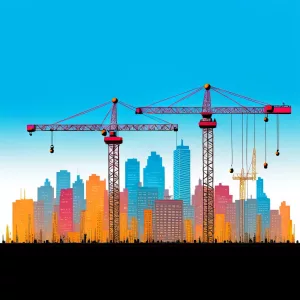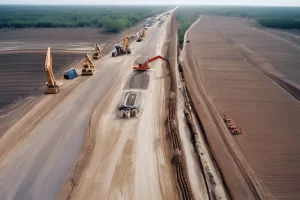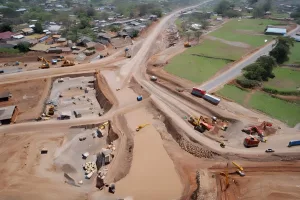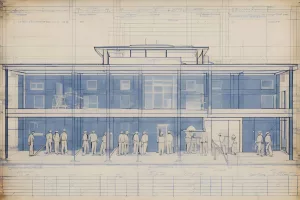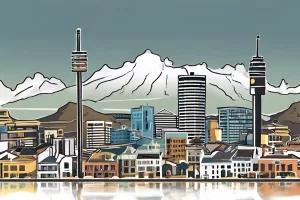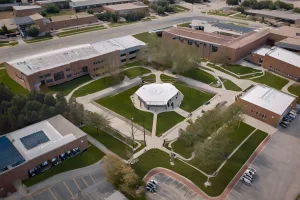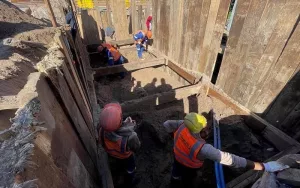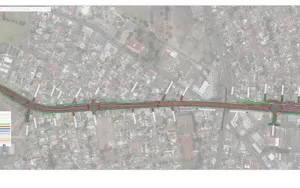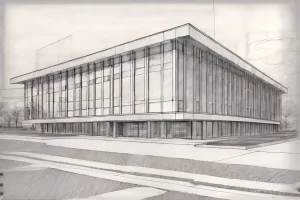KwaZuluNatal province just had a wild week of inspections! Officials zoomed around, checking out good and bad building projects. They saw amazing new taxi ranks and roads, but also found empty, crumbling houses and schools with no roofs. Now, KZN is making tough new laws, like making sure 8% of money always goes to fixing things and giving projects ‘readiness certificates.’ They even plan to put officials on the spot every 90 days. This big shakeup could change laws for the whole country, all to make sure money is spent right and communities get what they were promised.
The LimpopoGauteng bullet train is South Africa’s first highspeed train, set to connect Pretoria to Musina and cut travel time from over five hours to just 90 minutes. This fast, modern train will link cities and towns, boost trade, create jobs, and bring new opportunities to many people. Though building it faces challenges like protecting nature and funding, the project shines as a bright symbol of hope, progress, and unity for the country’s future. South Africans are excited to see this dream turn into a speedy reality that can change lives.
Cape Town is making a big leap toward cleaner energy by getting R2.8 billion from the German Development Bank. This money will help the city build a strong energy system that can handle power outages and create around 130,000 jobs. It’s not just about electricity; this project aims to support lowerincome communities and improve lives. With this bold move, Cape Town is showing the world that cities can work together for a greener and brighter future.
Infrastructure is crucial for South Africa’s growth and change, acting like the backbone of the country. It helps create jobs, connect communities, and ensure everyone has access to resources. With big plans like the Economic Reconstruction and Recovery Plan, the government aims to boost energy, transport, and digital services, moving towards a brighter, fairer future. Projects like building bridges in rural areas show a commitment to uniting people and healing past injustices. Overall, infrastructure development is about building not just roads and bridges, but a better life for all South Africans.
Deputy President Paul Mashatile is leading the charge to improve South Africa’s infrastructure, focusing on better roads, energy, and communication systems. By encouraging private investment and overcoming red tape, he aims to boost the economy and enhance the lives of everyday people. Mashatile believes that strong infrastructure is key to growth and job creation, helping to connect communities and support local businesses. With ambitious plans ahead, he invites stakeholders to work together for a brighter, more sustainable future for all South Africans.
The Jakes Gerwel Drive rehabilitation project in Cape Town is set to make a bustling route safer and better for everyone. Starting from September 30, 2024, workers will tear up old pavement, lay down fresh asphalt, and improve drainage systems to keep roads in good shape. This project isn’t just about fixing the road; it’s about creating a brighter future for the community with ecofriendly practices and safer travel. It’s a symbol of hope and growth, reminding us that even when things get messy during construction, great improvements are just around the corner.
Cape Town is building a new stormwater system on Japhta K Masemola Road to improve road safety and prevent flooding caused by the existing drainage system being blocked. The infrastructure project is part of the city’s commitment to sustainable development and aims to enhance the quality of life for all residents. The Road Infrastructure Management team is working to ensure the project’s successful completion, and motorists are advised to seek alternative routes during the construction period. This initiative showcases the City of Cape Town’s dedication to progress and safety, providing a model for other cities worldwide.
The Western Cape Department of Health is pioneering healthcare initiatives by constructing new facilities such as the Klipfontein, Belhar, and New Tygerberg Central hospitals. These projects aim to improve healthcare accessibility and efficiency in the area, despite financial limitations and challenges. The Klipfontein Regional Hospital and Belhar Regional Hospital projects are set to be completed by 2033, while the New Tygerberg Central Hospital project has an estimated budget of R11 billion and is set to begin construction between 2028 and 2032. Despite financial obstacles, the department remains committed to its objective of providing accessible healthcare for all.
The 2024/25 Budget Vote of National Treasury: A Blueprint for Financial Stability and Economic Unity
The 2024/25 Budget Vote of National Treasury is a blueprint for financial stability and economic unity in South Africa. It aims to reduce the fiscal deficit and debtservice costs through stringent spending controls and revenue initiatives, while promoting fiscal sustainability, economic integration through infrastructure development, and sustainable development. The plan requires the united efforts and commitment of all stakeholders, including the government, private sector, and citizens, to achieve its goals.
Cape Town has made an unwavering commitment to infrastructure development and has invested over R863.6 million in 2023/24 to replace water and sewer pipes. The city has already replaced 35,000 metres of piping and plans to replace even more in the future. This dedication serves as a model for other cities, showing the importance of sustainability and improving the quality of life for residents. The city’s efforts showcase how infrastructural development and preservation form the backbone of building a sustainable urban habitat.
Cape Town engaged its citizens in budget planning through open dialogue, inclusivity, and infrastructure development, addressing unemployment and supporting youth, and robust governance and transparency. The city facilitated 79 meetings, offering a blend of facetoface and online options, catering to the diverse needs of all residents. The public’s participation in the City’s draft budget signifies a mix of civil duty, public accountability, and transparent governance, resulting in a city that is progressing in harmony with a unified vision and a strong sense of community involvement.
The launch of the Balfour Campus for Gert Sibande TVET College marks a new era in accessible, highquality education in South Africa. The ultramodern facility is a symbol of the nation’s commitment to delivering the best to its young generations and overcoming past struggles in the TVET College sector. Its construction, worth approximately R150,000,000, offers diverse programs to meet the needs of an evolving economy, and it stands as a beacon of hope and a hub of opportunities for students in the Gert Sibande District.
Uitsig is struggling with a 165% increase in sewer blockages due to outdated infrastructure and incorrect waste disposal practices. Despite a pipeline replacement project starting in July 2023, only 8.2% completion has been achieved due to the dual threats of extortion and public safety. The City has set up a 24hour hotline for anonymous reporting of incidents of extortion and urges residents to be mindful of what they discard to ensure a cleaner, safer, and more efficient Uitsig.
South Africa’s upcoming elections offer the promise of strengthening democratic principles and paving the way for a fairer basic education system. The country has made significant progress in achieving nearuniversal access to education for 7 to 15yearolds, and initiatives like the National Student Financial Aid Scheme and a focus on entrepreneurial skills further support education beyond the confines of schools. The North West Basic Education Lekgotla exemplifies the transformative power of unity and teamwork in enhancing the quality of basic education across the province, with a focus on infrastructure development and promoting STEM education.
Transforming Urban Transit: The New Phase of Infrastructure Development on Turfhall Road
The Turfhall Road transformation project aims to connect several communities through a dependable, affordable, and safe public transportation service. The project involves building two dedicated bus lanes, reconstructing two lanes for eastbound and westbound traffic, and adding pedestrian and cycle paths on both sides. The construction will unfold in planned phases and is set to be completed by July 2027, with the aim of enhancing urban mobility and building a better, more interconnected future for the community. Despite the inevitable disturbance brought about by construction work, the city is committed to minimizing disruptions and creating temporary job opportunities.
The launch of the Ikhala TVET College’s engineering campus is a major milestone for South Africa’s education system. The government invested R221m to expand the country’s educational infrastructure and provide opportunities for socioeconomically disadvantaged youth. The campus will also offer workplace training through partnerships with local businesses and municipalities. The inauguration marks a new chapter in education and a bright future for young individuals in the Joe Gqabi district.




